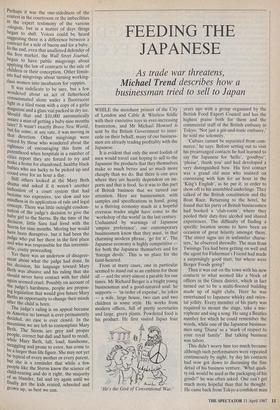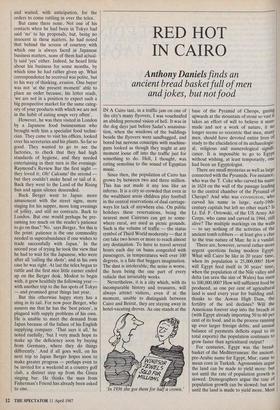FEEDING THE JAPANESE
businessman tried to sell to Japan
WHILE the merchant princes of the City of London and Cable & Wireless fiddle with their executive toys in ever-increasing frustration, and Mr Michael Howard is sent by the British Government to inter- cede on their behalf, many of our business- men are already trading profitably with the Japanese. It is evident that only the most foolish of men would travel east hoping to sell to the Japanese the products that they themselves make so much better and so much more cheaply than we do. But there is one area where they are heavily dependent on im- ports and that is food. So it was to this part of British business that we turned our attention. Here are businessmen, with samples and specifications in hand, going to a thriving economy much as a hopeful overseas trader might have come to the 'workshop of the world' in the last century. Undaunted by warnings of Japanese 'empire preference', our contemporary businessmen know that they must, in that charming modern phrase, `go for it'. The Japanese economy is highly competitive — for both the Japanese themselves and for 'foreign devils'. This is no place for the faint-hearted.
From at many cases, one in particular seemed to stand out as an emblem for them all — and the story almost a parable for our times. Mr Richard Berger is a bright young businessman and a good-natured soul: he supports — 'in order of expense', he jokes -- a wife, large house, two cars and two children in some style. He works from modern offices, full of pretty secretaries and large, green plants. Powdered food is his product. He first visited Japan four 'He's the God o Conventional War.' years ago with a group organised by the British Food Export Council and has the highest praise both for them and the commercial staff of the British embassy in Tokyo. 'Not just a gin-and-tonic embassy,' he told me solemnly.
'Culture cannot be separated from com- merce,' he says. Before setting out to visit his prearranged contacts he had learned to say the Japanese for 'hello', 'goodbye', 'please', thank you' and had developed a very distinguished bow. His first contact was a grand old man who insisted on conversing with him for an hour in the 'King's English', as he put it, in order to show off to his assembled underlings. They talked of the British constitution and the Boat Race. Returning to the hotel, he found that his party of British businessmen had booked a 'club-room', where they pooled their duty-free alcohol and shared experiences. The difficulty of finding a specific location seems to have been an occasion of great hilarity amongst them. `The street signs are in unfamilar charac- ters,' he observed shrewdly. The man from Twinings Tea had been getting on well and the agent for Fisherman's Friend had made a surprisingly good start, but where were Berger Foods going?
Then it was out on the town with his new contacts to what seemed like a block of offices in the Ginza district, which in fact turned out to be a multi-floored building made up of night clubs. Here he was entertained to Japanese whisky and orien- tal jollity. Every member of his party was required to mount the stage, take a mic- rophone and sing a song. He sang a Beatles number for which he could remember the words, while one of the Japanese business- men sang 'Diana' as a 'mark of respect to your royal family'. But talking business was taboo.
This didn't worry him too much because although such performances were repeated continuously by night, by day his contacts had now got down to discussing the fine detail of his business venture. 'What quali- ty ink would be used in the packaging of his goods?' he was often asked. One can't get much more hopeful than that he thought. He came back from Tokyo a confident man and waited, with anticipation, for the orders to come rattling in over the telex.
But came there none. Not one of his contacts when he had been in Tokyo had said 'no' to his proposals, but, being no innocent in these matters, he had noted that behind the screen of courtesy with which one is always faced in Japanese business matters, none of them had actual- ly said 'yes' either. Indeed, he heard little about his business for some months, by which time he had rather given up. What correspondence he received was polite, but to his way of thinking, evasive. One buyer was not 'at the present moment' able to place an order because, his letter reads, 'we are not in a position to expect such a big prospective market for the same categ- ory of your products with which we are not in the habit of eating soups very often'.
However, he was then visited in London by a Japanese food businessman who brought With him a specialist food techni- cian. They came to visit his offices, looked over his secretaries and his plants. So far so good. They wanted to go to see the factories, to check that they had high standards of hygiene, and they needed entertaining in their turn in the evenings: Raymond's Review Bar the first night — they loved it; Oh! Calcutta! the second — but they couldn't make head or tail of it. Back they went to the Land of the Rising Sun and again silence descended.
Back Berger went to Japan: more amusement with the street signs, more singing for his supper, more long evenings of jollity, and still no contracts. Back to London. But one would perhaps be pre- suming too much on the reader's patience to go on thus? 'No,' says Berger, 'for this is the point: patience is the one commodity needed in superabundance if one wishes to trade successfully with Japan.' In the second year of trying he took the view that he had to wait for the Japanese, who were after all 'calling the shots'; and in his own case he was right. At last the telex began to rattle and the first nice little earner ended up on the Berger desk. Modest to begin with, it grew healthily the following year — with another trip to the fun spots of Tokyo — and promised great things last year.
But this otherwise happy story has a sting in its tail. For now poor Berger, who assures me that he has the 'best prices', is plagued with supply problems of his own. He is unable to meet the demand from Japan because of the failure of his English supplying company. 'That says it all,' he noted ruefully; tut I very much hope to make up the deficiency soon by buying from Germany, where they do things differently.' And if all goes well, on his next trip to Japan Berger hopes soon to make greater progress — perhaps even to be invited for a weekend at a country golf club, a distinct step up from the Ginza singing bar. He thinks the man from Fisherman's Friend has already been asked to one.

























































 Previous page
Previous page